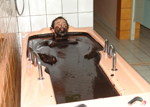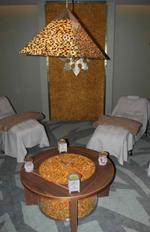|
Editor's
note: Welcome to the Global Health page. The purpose of this feature is
to raise awareness of global health issues with an academic spirit to
help improve the quality of care provided to patients. E-mail
globalhealthnews@musc.edu.
by Kristina
Andrijauskaite
Graduate Student
Many people still think that Lithuania is part of the Soviet Union, but
they are incorrect. Lithuania became the first independent Soviet
republic in 1990, and now is a member of the European Union, NATO and
other international organizations.
Lithuania is located in the geographical center of Europe and shares
borders with Belarus, Poland, Latvia, and Russia. It has about 3.5
million inhabitants and its official language—Lithuanian, is the oldest
language in Europe.
Despite being a small country, Lithuania attracts visitors from all
over the world to get unique health treatment services ranging from
herbal baths to light therapy sessions.
Lithuania’s largest health resort, Druskininkai, offers a unique
amber-aroma music therapy. Designed and patented by Lithuanian
scientists, it is believed to have a healing, anti-inflammatory and
calming effect. The therapy begins after a piece of amber, a fossilized
tree resin, is placed on the patient’s neck. The patient is moved on a
mattress filled with small pieces of amber, and the special music along
with the smells coming from the amber and various herbs allow the
patient to relax and enjoy the tranquility. It is scientifically
suggested that amber biologically affects various zones of the human
body, improves the functions of the endocrine system, and releases
biologically active amines (e.g., serotonin “happiness hormone”). The
Palanga Amber Museum, located in another health resort, holds the
world’s largest collection of amber, often called “the gold of Baltics.”
 A client takes a
therapeutic mud bath. A client takes a
therapeutic mud bath.
Many other health
treatment therapies in Lithuania include the use of
mineral water and therapeutic mud. Mineral water has a positive effect
on the mucous membrane of the stomach, reduces stomach acidity,
regulates gastrointestinal motorics and the exchange of electrolytes
and hormones, and strengthens the immune system. Patients can drink
water of different mineralizations and compositions straight from the
springs. Therapeutic mud is the product of long decomposition of
vegetative organisms with almost no exposure to oxygen taking place in
low marshlands. Because of the mud’s physical, chemical and
microbiological properties, it is suitable to be used for treatment
with baths, applications and compresses. It is effective in treating
peripheral nervous system disorders, various chronic inflammatory
processes, allergic and autoimmune cases, and joint, muscle, digestive,
gynecological and urological illnesses.
 An amber-aroma
music therapy room in Lithuania. An amber-aroma
music therapy room in Lithuania.
The Lithuanian Sea
Museum is one of only a few in Europe that offers
dolphin therapy sessions for children with psychological and physical
illnesses, with an emphasis on autistic children. Parents believe their
children benefit from the calmness they obtain from the dolphins and
clinical trials have shown an improvement in these children.
These are just few unique health treatment services provided by
different medical centers across Lithuania.
Facts about
Lithuania
- The official name of
Lithuania is The Republic of Lithuania.
- Lithuania
is situated in Eastern Europe, between Latvia and Russia, and stands
bordered by the Baltic Sea, Belarus and Poland.
- Lithuania
is one of countries that make up the Baltic States. However, contrary
to what the name suggests, the states do not share political unity.
- The
official language of Lithuania is Lithuanian. However, the majority of
the people speak Russian and English also.
- Lithuania
is spread over an area of approximately 65,300 sq km (25,212 sq miles)
and is about the same size as West Virginia.
- The state
of Lithuania is an independent, democratic republic and follows
Parliamentary democracy.
- Lithuania
was the last country in Europe to be converted to Christianity. Before
Christianity, the country’s religion was Romuva.
- The capital
of Lithuania is Vilnius.
- Juozapines
Hill (294 m) forms the highest point in Lithuania, while the largest
and longest river in the country is Nemunas.
- Lithuania
had only one king during medieval times, King Mindaugas.
- The first
publishing house in Lithuania was founded in Vilnius, in 1522, and the
first Lithuanian Book was published in 1547.
- The mother
of Pope John Paul II was of Lithuanian descent.
- Lithuania was the
first Soviet republic to declare independence from the USSR.
- Lithuania joined the
United Nations on Sept. 17, 1991 and the European Union on May 1,
2004.
Announcements
New
International Student Orientation
Aug. 25, 4 - 5:30
p.m. (light dinner), SW 224 Harper Student Center
ISA/IA Steering Committee Meeting
Aug. 31, 5 - 7:30
p.m. (light dinner), Executive Conference Room, Harper Student
Center
ISA/IA ‘Welcome Back’ Lunch
Sept. 1, Noon - 1
p.m., Harper Student Center Auditorium
Visit http://www.musc.edu/international.
Friday, Aug. 6, 2010
|




